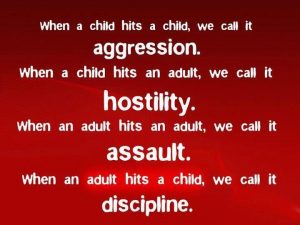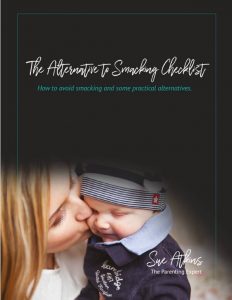


Like it? Share it!

I’ve just come off the sofa on ITV ‘Good Morning Britain’ with Jeremy Kyle and Kate Garraway discussing smacking.
I felt the pressure of 2 presenters and a lady from a Charity agreeing that it’s OK to smack, tap, and hit a child as it depends on the circumstances.
Britain is only one of four other countries who don’t have a ban on smacking and the law is murky and unclear.
As a former Deputy Head if I saw a child hit another child I would stop them as they are behaving aggressively. If I saw a man hit another man in a pub I would call that assault. Yet why is it that when an adult hits a child we call it discipline ?
It can be tempting to think a smack sorts out incidents like disobedience and biting.
However, it does nothing to teach your child how you want him or her to behave.
Instead it:
Gives a bad example of how to handle strong emotions
May lead children to hit or bully others
May encourage children to lie or hide feelings to avoid smacking
It can make defiant behaviour worse, so discipline gets even harder
Leads to a resentful and angry child, damages family relationship if it continues for a long time.

I believe there are many other better ways to raise a happy, confident, well behaved child without resorting to smacking them.
Children need firm, fair, consistent boundaries and they need you be confident, assertive and clear on what is, and what’s not, acceptable behaviour.
They need your guidance in how to behave.
In fact there were two children on before me from the programme ‘Child Genius’ and the 9 year old thought it was OK to get up, take the remote control from out of its place on the Green Room wall without asking and change the channel away from ‘Good Morning Britain’ the programme he was just about to appear on without his mother reprimanding him, apologising for his boldness or even correcting his bad manners.
Kids need boundaries.
Kids need rules.
Kids need to be guided & taught what your family expects of them, what school expects of them and what society expects of them.
They need to learn self-discipline & self- control.
I remember asking my husband both times when my kids were born:
“Are they healthy?”
This question is one that is pretty easy to answer but another question that is far more difficult to answer is:
“Will my child become a good and decent human being?”
Nothing guarantees that our children will turn out exactly the way we want them to, but we CAN increase the likelihood pf producing capable, well-adjusted adults if we put thought and effort into our parenting skills.
The first place to start is by asking ourselves some good questions.
All human beings strive to fulfil get their needs met. Whether is feeling significant and valued or feeling part of a family or a community. Children are young and inexperienced so they are learning all the time appropriate and not so appropriate ways to get their needs met.
If we teach them constructive behaviours to get the desired results, your child builds that into their experience and view of the world. If misbehaviour gets your attention, then they build that into their fulfilment strategy. As any attention is better than none. Children are looking for the Crucial ‘C’s* of Connection, Capability, Counting and Courage to find their place in the world.
Read more about the Crucial ‘C’s* in raising happy, confident, resilience children here as it is my Blueprint for raising well adjusted, happy adults who go on to succeed in life.
When children only experience a sense of failure and negativity they lose courage to try again. They also lose confidence.
If we want to raise children with strong self-esteem who are well adjusted, we need to become aware of our part in helping them learn from their mistakes and make better choices next time.
There is a purpose behind and underneath every behaviour. Your job as a parent is to be a Detective and to start looking beneath the behaviour to the cause.
Misbehaviour is a symptom of the wrong conclusions.
A child who is discouraged about his or her ability to connect, feel capable and count feels discouraged and they develop coping strategies to compensate which are usually unhelpful. These coping strategies may include, avoiding, messing about, quitting, bullying, controlling, forgetting, denying, blaming another, or dragging their heels.
Children who don’t feel connected feel insecure & isolated so they might seek attention.
Children who don’t feel capable feel inadequate. So, they may seek out power by trying to control others.
Children who don’t feel that they count, matter or are significant may try to punish others for their feelings of insignificance. They might seek revenge to hurt back as they feel hurt themselves.
Children who lack courage often feel inferior. They use avoidance and give up too easily.
Once you start to see beneath your child’s misbehaviour you can start to help them feel connected by cooperation, to feel capable through self-reliance, to feel that they count by contribution and to develop resiliency through courage.
Start by looking beneath the behaviour to the root cause.
Then look for ways to help them feel positively loved, respected, and guided towards better choices. Look for better, or new ways, to help your child feel connected, capable, that they count & give them courage to keep trying.
Why kids need rules – here’s a checklist to help.
Does your child hear the word, ‘No!’ more than 400 times a day?
Smacking is really NOT the answer…..
The Goals Behind Your Child’s Behaviour.
*References to:
B.L. Bettner and A. Lew (1989, 2005), Raising Kids Who Can, Newton Centre, MA: Connexions Press.
Dr. Rudoph Dreikers Children: The Challenge” (Plume)
Alfred Adler Individual Psychology Harper Collins
Discussing every possible aspect of parenting, giving you advice and support on topics which affect your daily life. Each free, weekly episode is bursting with practical tips, techniques and ideas.
I will teach you my no-nonsense, simple techniques & give you hundreds of my expert parenting articles, videos & podcasts so you can get back to the business of having fun with your family!



